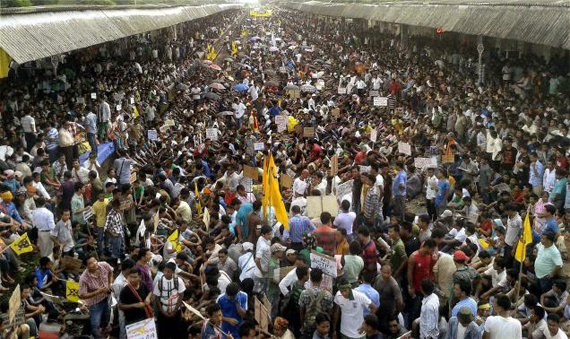
Guwahati, Aug 4: The turmoil over statehood demands continued in Assam on Saturday amid stray incidents of violence. While government office and public properties were torched in Karbi Anglong district, the Bodoland People’s Front (BPF) is preparing for a massive showdown in Kokrajhar on Sunday to press for the creation of a separate Bodoland State.
Tension gripped the Bodoland Territorial Area Districts (BTAD) areas as vehicles were torched and tyres burnt on roads during a 36-hour State bandh called by the Aboro (non-Bodo) Surksha Samiti, who are opposed to the bifurcation of Assam for the sake of Bodoland.
Bodoland Territorial Council chief executive member and BPF president Hagrama Mohilary, however, said his party would mobilise people living in the proposed Bodoland areas in Sunday’s Statehood demand rally in Kokrajhar.
In Karbi Anglong’s Diphu town, curfew was relaxed for three hours from 8 a.m. to 11 am on Saturday. Assam Revenue and Disaster Management Minister Prithibi Majhi and Water Resources Minister Rajib Lochan Pegu visited the hill town to take stock of the situation.
Karbi Anglong SP Mugdhajyoti Mahanta told The Hindu that there had been two incidents of miscreants setting fire to a bamboo craft training institute and an unmanned firm on Saturday. No incident was reported from Diphu town. In Dongkamokam area under Hamren Sub-division, curfew was clamped on Friday following arson upon government institutions and public properties. Hamren SP Nityananda Goswami, however, said the situation was under control. In Dongkamokam, an office of the Hill State Democratic Party (HSDP), which has been demanding creation of a separate State comprising the two hill districts, was torched.
Kamatapur stir
In the city, hundreds under the banner of the All Koch Rajbangshi Students’ Union (AKRSU) staged a demonstration in front of Raj Bhawan here, demanding the creation of a separate Kamatapur State comprising 15 districts of Assam and six districts of West Bengal, including Darjeeling. AKRSU president Biswajit Ray urged the Bodo organisations to extend support to the movement for Kamatapur claiming that the proposed State had been acknowledged historically among the Koch-Rajbangshis.
The Statehood movement in twin hill districts Karbi Anglong and Dima Hasao is now poised to be intensified with 13 organisations forming a Joint Action Committee for Autonomous State (JACAS) to press for the creation of an autonomous State comprising the two hill districts under Article 244 (a) of the Constitution. On the other hand, leaders of the erstwhile militant outfit United People’s Democratic Solidarity tore up the peace accord by which it had agreed to give up arms and settle for enhanced autonomy for Karbi Anglong in lieu of Statehood.
The supporters of Statehood are divided into two groups — one led by the Congress and associated organisations demanding an autonomous State within Assam under Article 244(a) and the other led by the HSDP and associated organisations demanding the creation of a separate State by carving out the two hill districts from Assam.
Trains cancelled
The railway blockade organised by the All Bodo Students’ Union on Friday led to snapping of the rail link between the northeast and rest of India. A railway track was sabotaged in Karbi Anglong. As a result, the Northeast Frontier Railway authorities on Saturday cancelled 15 short-distance passenger trains and two long-distance trains amid difficulties. Thousands of passengers were stranded in Guwahati and other railway stations. The State arranged buses to transship the stranded to the Inter State Bus Terminus.





Comments
Add new comment